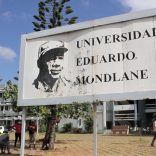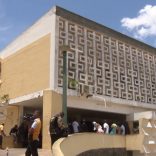Mozambique: Mpox cases in Niassa rise
Mozambique: ‘The world is watching what is happening in country’ – press freedom award winner

File photo: Ricardo Franco / Lusa
The executive editor of Canal de Moçambique, a newspaper torched in 2020 by unknown assailants, says the press freedom award he will receive on Thursday shows that the world is paying attention and is a sign for young people.
“It is an influence for young journalists” and “a great message given the challenges that the independent press is going through in Mozambique,” showing that “the world is paying attention” to what is happening in the country, Matias Guente said on Wednesday in an interview with Lusa.
Press freedom “is a universal good” and “there is no country, government or interest groups that can shape the way it is exercised”, he stressed.
The Committee to Protect Journalists (CPJ), an independent organisation based in New York, has awarded the International Press Freedom Prize 2021 to four journalists, among them Matias Guente.
The organisation singles out the Mozambican journalist because “over the years he has faced a series of threats for his harsh reporting, including police interrogations, charges of violation of state secrets and conspiracy, and an attempted kidnapping in 2019”.
In August 2020, unknown persons set fire to Canal de Moçambique at night on the ground floor of a residential building in Maputo, an assault that “crossed all limits: I didn’t think we would go to that extreme,” he told Lusa.
No one was on the premises, but the destruction was total.
The newspaper received donations and the newsroom was set up under awnings outside the building to print the next edition.
Today the ground floor is renovated, but the executive editor says the case scarred him because responsibility was never ascertained, as one would expect “in a normal country”.
The investigation into the fire was shelved for lack of evidence.
“We were left with the threat that [the perpetrators] might return, because the path of non-accountability was left open,” he said.
He attributes a broader meaning to the case having been shelved, saying “they are silencing the right to opinion”, a move led by interest groups that feel affected and against which he says he continues to battle.
He shows the cover of this week’s issue: ‘Millionaire Subsidies’ – an article that questions the self-attribution of subsidies by Social Security administrators.
“We are not necessarily ‘kamikazes’, but we believe that there is a democracy to be defended, that the freedom of citizens must be defended at all costs, because it cost blood, and our way of honouring those who fought is to defend freedom itself,” he said.
Single, and born in the city of Beira, he does not give out his age, saying only that he assumed responsibilities very early.
He already ran a publication in secondary school and later, while studying journalism at the Eduardo Mondlane University (UEM), he wrote an opinion piece questioning a price rise in the canteen.
The article caught the attention of a professor and opened the door to an internship at the Tribuna Fax, in 2007. Two years later he moved to the editorial staff of Canal.
He has already had prosecutors and judges asking him to reveal sources, apparently ignorant that the law protects journalists’ confidentiality, he told Lusa.
“Journalists know more about press legislation in most cases than lawyers,” he said, warning of the need for specialisation in the area.
He subsequently enrolled in law school in 2009, himself participating in the definition of strategies for several cases in which he found himself involved.
“Many cases would not even have started if there had been the rule of law,” he said, contesting the proposed media and broadcasting laws that are on the agenda for debate in parliament until the end of this year.
“The impression that remains is that [the legislative package] was conceived in a police station” and that “the journalist is treated as the enemy”.
Points in the draft law that concern him include journalists losing the right to defend themselves in cases of defamation against the President of the Republic – the right to defence being guaranteed by the Constitution; restrictions on private investment in the media being redefined and there are overlaps between disciplinary and supervisory bodies.
He classifies such attempts to legislate as “formal machinery” to limit journalists’ work, alongside the “informal machinery” responsible for acts such as setting fire to the Canal’s newsroom or kidnappings, recalling that journalist Ibraimo Mbaruco has been missing since April 2020 in Cabo Delgado after sending a text message saying he was “surrounded by the military”.
“I have hope, because I am Mozambican and I believe that one day this country will improve, but the chronology of events leaves me deeply concerned,” Matias Guente concluded.
The Mozambican journalist stands alongside others from Belarus, Guatemala and Myanmar, who have faced “violence, harassment, repression and persecution, but have refused to back down” from their mission, said the executive director of the Committee to Protect Journalists, Joel Simon, when the awards were announced in June.
Join us on Thursday, November 18 at 8 p.m. EST for CPJ’s International #PressFreedom Awards to honor courageous journalists from around the world.
This year’s awardees include:
Anastasia Mejía
Matías Guente
Aye Chan Naing
Jimmy LaiMore about #IPFA: https://t.co/lvluBs6ZfC pic.twitter.com/Rdth4EOZMo
— Committee to Protect Journalists (@pressfreedom) November 16, 2021













Leave a Reply
Be the First to Comment!
You must be logged in to post a comment.
You must be logged in to post a comment.